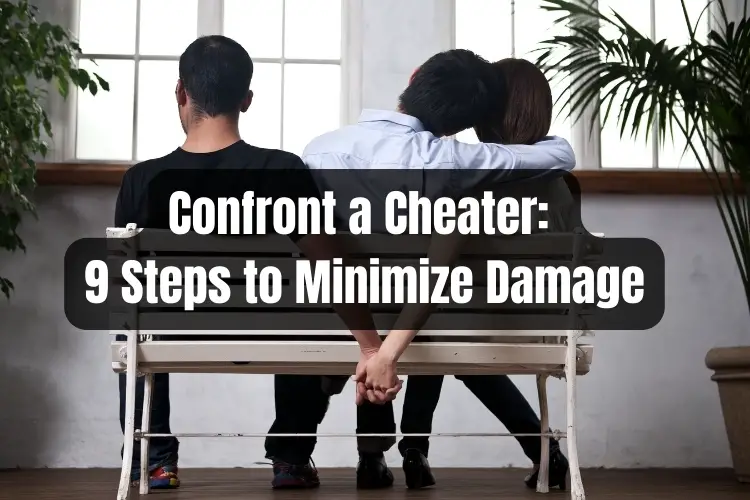Confront a Cheater to Minimize Damage
Discovering evidence that confirms your partner is having an affair often provokes feelings of rage, resentment, hurt, devastation, and betrayal. While confronting a cheating partner is an emotionally challenging prospect, addressing infidelity openly and honestly gives relationships the best opportunity to heal.
Follow these 9 steps when confronting unfaithful partners to improve chances of overcoming affair fallout.
1. Release Initial Anger Privately

Hearing the truth that your spouse or lover has been unfaithful often ignites intense fury and outrage. Vent these feelings privately before confronting your cheating partner. Put yourself in the right state of mind to have a productive dialogue, not escalate tensions further.
2. Collect Evidence Discreetly

Discreetly gather corroborating evidence of the affair timeline, details, scope, and involved participants. Concrete proof will counter a cheater’s tendency to deny, deflect, justify, or lie about their activities. Verifying your cheating partner’s activities also protects you if legalities come into play later.
3. Decide What Outcome You Want

Before confronting adulterous partners, decide what it is you want from the interaction. Do you seek the unvarnished truth? To end the relationship? To work on forgiveness? Appropriate consequences for their behavior? Knowing your own desired direction allows you to guide dialogue towards resolving your concerns.
4. Pick a Neutral Time and Place

Arrange the difficult conversation at a time when you are both sober, calm, alert, and can carve out dedicated time for meaningful dialogue.
Avoid confrontation after work obligations, holidays, family gatherings, weekends away, or during illness when either party has limited bandwidth. Pick a private, neutral spot devoid of distractions so feelings can be unpacked constructively.
5. Maintain a United Front if Possible

Ideally, confront cheating partners together with co-parents, close friends, a counselor, or religious leader united in supporting your marriage or relationship.
Back up lends you strength, objectivity, sound feedback, and spiritual guidance to navigate turbulent waters ahead. If solo confrontation feels safer initially, fill your support network in later.
7. Share Indisputable Evidence Calmly

Lead with evidence, not accusations, when confronting adulterous partners. Remain composed presenting proof of deception and infidelity you’ve discovered to pave the path for honest dialogue and true behavioral change. CYA with documentation should legal issues arise.
8. Allow Space for Response and Denial

Expect your cheating partner to dispute allegations, invalidate proof, or dismiss their behavior initially no matter how air-tight evidence appears. Cheaters often convince themselves their affairs are harmless, white lies told to protect their spouse, or products of issues in the marriage.
Allow them space to offer explanations or think through implications before reacting.
9. Stand Firm on Acceptable Outcomes

Clearly articulate what behaviour changes, couple’s counselling sessions, financial remedies, or relationship provisions you require to heal trust and find a way forward after violations. Define what is non-negotiable in light of deception without equivocating or softening your position. Follow through enforcing those boundaries.
10. Prepare to Walk Away

Confronting deep-seated marital issues like infidelity rarely leads to instant solutions. The road back from betrayal is long and intense.
Make preparations to physically distance through separation or divorce if your cheating partner refuses accountability, demonstrates no remorse, or continues contact with affair partners. You alone can determine if you feel your marriage remains tenable. Walking away demonstrates what you will tolerate long-term.
Conclusion
Healing after infidelity unearthed in a committed relationship takes tremendous internal fortitude from both parties plus consistent external support. But overcoming deception related to cheating builds stronger foundations based on honesty, vulnerability, accountability, communication, forgiveness, and trust restored.
Confront affairs compassionately but decisively to take the first steps. The keys to catching cheating partners are recognizing subtle red flags, verifying suspicions discreetly, confronting adulterers deliberately yet empathetically, and taking a firm position on what behaviors you accept long term.
Professional counseling lends much-needed support navigating turbulent aftermaths. While overcoming infidelity poses intense challenges, many relationships emerge healthier and more resilient for having weathered the storm.
FAQs:
How do I know for sure if my partner is cheating?
Some signs of a cheating partner may include changes in their routine, less intimacy, more protective behavior over their phone/email, spending more time away from home, changes in appearance/grooming habits, and vague excuses for their whereabouts. If you suspect cheating, looking for multiple signs gives more confidence before confrontation.
What is the best way to confront my cheating partner?
If possible, confront them in a calm manner, stick to the facts you know without speculation, use “I feel…” statements to explain how their actions impacted you, and give them a chance to explain themselves. Avoid publicly shaming or aggressive accusations. The goal is to communicate your feelings and understand why it occurred.
Should I break up with a cheating partner immediately?
There is no definitive answer. Some relationships can heal after infidelity with counseling and rebuilding trust over time. But cheating often indicates problems like poor communication, lack of intimacy, or ignoring each other’s needs. You must decide if those issues can realistically improve.
If I stay with a cheating partner, will they cheat again?
There are no guarantees, but according to studies, repeat offense rates for adultery range from 15-74%. Getting counseling significantly lowers repeat occurrence. Without obtaining relationship help or addressing underlying problems, another affair is more likely.
How do I regain my self-confidence after being cheated on?
Being cheated on can severely damage self-esteem. Healing takes time. Make sure to engage in regular self-care, spend time pursuing your interests/passions, connect with supportive friends/family, and consider speaking to a counselor if you struggle with anxiety, depression, or trauma.
Should I tell my partner’s family or friends that they cheated?
Telling others can backfire by embarrassing your partner or permanently damaging their reputation. Typically it is wisest to address the cheating directly with your partner first before involving outside parties. However, close friends/family may help persuade the cheater to change their behavior.
Can I trust my feelings for a cheating partner will go away?
It is natural to still love someone who betrayed you. Your emotions may fluctuate between love, anger, sadness, and confusion for some time. Allow yourself to feel and process the emotions rather than suppressing them. In most cases, romantic feelings do eventually fade as the relationship dissolves.
Is it unhealthy to stay with a cheating partner for the kids?
While many couples justify staying together for the children, an unhealthy relationship can negatively impact kids more than separation in some cases. However, the quality of parenting, communication, conflict resolution, and chance of future affairs should be considered when deciding whether to stay or go.
How long should I wait after confronting my partner’s cheating to make any big decisions?
Making major life changes in an emotional state rarely ends well. Allow a few weeks after the initial confrontation for the intense emotions to stabilize, and speak to a professional relationship counselor to gain better clarity before making definitive moves like divorce.


